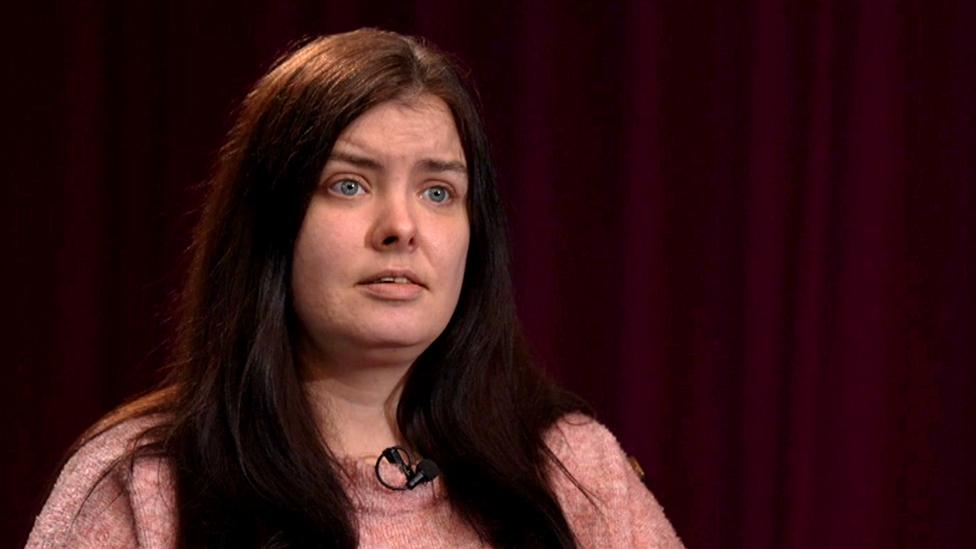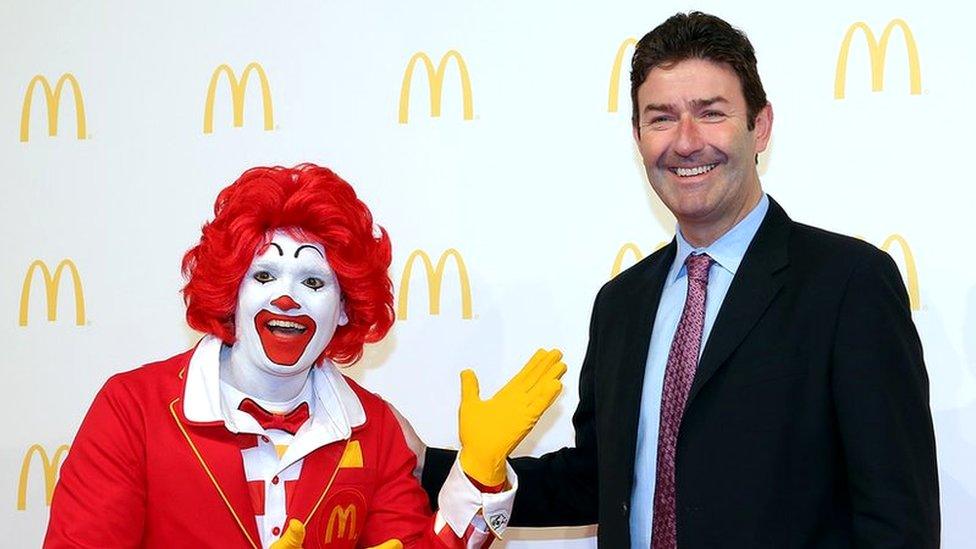McDonald's told to shut franchises over abuse claims
- Published

McDonald's should terminate franchise deals if branches are "not following labour law", the chair of the Business and Trade Committee has said.
MP Darren Jones said claims of sexual assault, harassment, racism and bullying by current and recent UK staff from the fast food chain were "some of the most appalling" he had seen.
A BBC investigation has been told workers, some as young as 17, are being groped and harassed almost routinely.
McDonald's has "deeply apologised".
The fast food giant admitted that it had "fallen short".
The BBC began investigating working conditions at McDonald's in February after the company signed a legally binding agreement with the Equality and Human Rights Commission (EHRC) in which it pledged to protect staff from sexual harassment.
At the time, McDonald's insisted it had a "strong track record in this area", but the investigation revealed a different picture, with more than 100 allegations from McDonald's workers relating to sexual assault, harassment, racism and homophobia over the past five months.
A spokesperson for Prime Minister Rishi Sunak said the allegations are "deeply concerning".
Most workers are not directly employed by the company as McDonald's uses a franchise system, which means individual operators are licensed to run the outlets and employ the staff.
McDonald's is one of the UK's largest private-sector employers. The fast food giant has more than 170,000 people working in 1,450 restaurants.
Mr Jones, a Labour MP, told the BBC's Today programme that the fast food chain must answer questions over how employment laws were being obeyed in its franchises and if such policies were in its contracts with local restaurants.
"I am sure they go in and check the quality of their burgers and whether their marketing standards have been put up properly and whether customers are happy with the quality of their milkshakes," he said.
"But are they going in and talking to the staff and making sure that they are being treated fairly and in line with the law? It sounds like they are not."
A spokesperson for McDonald's said its franchisees are required to sign an agreement, including a stipulation they will comply with UK law.
He said: "Our franchise agreement contains termination provisions should they not comply with these standards.
"Within our standards we specifically include People Brand Standards to ensure restaurants are operated in accordance with UK law in a manner that creates a safe, respectful, inclusive workplace and includes regular training and monitoring on prevention of harassment, discrimination and workplace violence."
Multiple workers told the BBC that McDonald's managers at the outlets across the UK were responsible for the harassment and assaults.
Watch: Former McDonald's worker says the company has 'little to no regard for our feelings'
Shelby was just 16 when she started working at a McDonald's restaurant in Berkshire last year. She said older male colleagues would use the cramped layout in the kitchen as an excuse to touch junior female staff inappropriately.
"They'd grope stomach, waists, bums," she said. "Every shift I worked, there would be at least a comment being made, or I'd be brushed, a hand brushed across me, or it would be a more severe thing, like having my bum grabbed, hips grabbed."
"It's the expectation that if you work at McDonald's, you will be harassed," added Emily, who's 20. She left her branch in Brighton last year, after a male colleague in his 60s kept stroking her hair in a sexually suggestive way and making her feel uncomfortable.
Caroline Nokes, chair of the Women and Equalities Select Committee, described the workers' allegations against McDonald's outlets as "horrific."
"Like so many cases, this isn't just about sex, it's about power. It's about older managers exploiting what is, at McDonalds a very young workforce," said the Conservative MP.
Wera Hobhouse, Liberal Democrat MP said the allegations were "yet another shocking example of the pervasive problem of workplace harassment".
"It is crucial they are properly investigated by McDonalds and employment watchdogs," she added.
Ms Hobhouse called for the government to back her Worker Protection Bill, which if made law, would make employers liable for tackling sexual harassment in the workplace.

What to do if you have been sexually harassed at work
Report it: Charity Victim Support, external says you can report it to your manager, HR representative or trade union who will take action.
Keep a record: Including dates, times and details of what happened, as well as any relevant emails. These could be helpful if you decide to report it.
Get help: Victim Support operates a free and confidential 24/7 helpline and live chat service. Call 0808 16 89 111 or use the live chat at: victimsupport.org.uk/live-chat, external.
Call the police: If sexual harassment escalates into violence, threats or sexual assault, you should report this to the police by calling 101. If you are in danger, call 999.

Alistair Macrow, chief executive of McDonald's UK & Ireland, said more than 2,000 managers had completed full awareness training and that most restaurant teams were now working within the new protections which aim to create "a safe and respectful workplace".
But Mr Jones said it was "all well and good McDonald's saying that they have provisions in their franchise agreement, but clearly these abuses have been able to take place in multiple places over many, many years".
He said managers who "get away with this behaviour...must do it partly because they know they can get away with it and it's McDonald's responsibility to make sure that can't keep happening".
If you have been affected by any of the issues in this story, information and support is available via the BBC Action Line.

Have you been affected by issues covered in this story? You can share your experiences by emailing haveyoursay@bbc.co.uk, external.
Please include a contact number if you are willing to speak to a BBC journalist. You can also get in touch in the following ways:
WhatsApp: +44 7756 165803
Tweet: @BBC_HaveYourSay, external
Please read our terms & conditions and privacy policy
If you are reading this page and can't see the form you will need to visit the mobile version of the BBC website to submit your question or comment or you can email us at HaveYourSay@bbc.co.uk, external. Please include your name, age and location with any submission.
- Published8 February 2023

- Published9 January 2023
